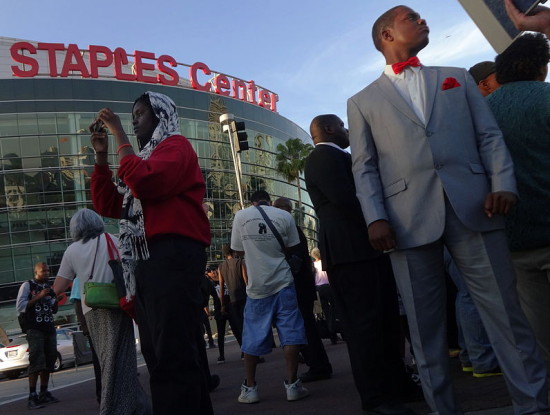
O
ne of my day-one homeboys is a comedian who goes by the handle The Average Black Man. One of the skits he performs with his comedy troupe is called “How to Catch a Racist.”
Well, from the looks of this past week’s Donald Sterling saga, one way to a catch racist is oh so simple: sit back and let him or her run their mouth.
But the heart of the matter for me was not the fact that an elderly bigot was unmasked—he was at least a semi-open racist for years—but that Sterling’s comments have given us a chance to revisit one of country’s oldest and most important questions: What is the worth of the average black man?
Sterling’s comments underscore is what plenty of other powerful folks think: no matter a black man’s paycheck, his value remains in question.
You could browse bookstores till your fingers go numb and not find a book that addresses this question as keenly and powerfully as Jesmyn Ward’s 2013 memoir Men We Reap. In it Ward writes about five young black men in her life, her brother included, who died within four years. She lets readers know the stakes for those men early and does so by discussing a fact of her old neighborhood: “the land the community park is built on… is designated to be used as burial sites so the graveyard can expand as we die; one day our graves will swallow our playground.”
The penalty was too soft. The penalty was too strong.
One might think the 300-plus males who rise from the playgrounds to earn millions in NBA (76.3% of NBA players last season were black) would be exempt from being grouped with their average-earning peers. But what Sterling’s comments underscore is what plenty of other powerful folks think: no matter a black man’s paycheck, his value remains in question.
My day-one homie, the one who’s an average black man on stage, barbers by day. While I was at the shop last week, Sterling was—surprise, surprise—the topic du jour. Between shoptalk and minding a week’s worth of news coverage, I’ve had the chance to hear, read, and consider reactions aplenty:
As for me, I said in the barbershop something like what I said near the intro of this piece: we average black men should be thanking old man Sterling because we are top of mind again.
Since we are but symbols, the chatter and outrage about a wealthy bigot’s comments will make not a scintilla of actual difference in our lives.
But these days later, I’ve had to rethink that stance. These days later it’s clear that at best we are top of the mind again—as a symbol.
And since we are but symbols, the chatter and outrage about a wealthy bigot’s comments will make not a scintilla of actual difference in our lives. This week and the next our worth will still be measured by men like him and the rest of the rulers of the universe as negligent.
During the infamous recording, Stiviano asks Sterling if he thinks he should take a stand, if he should be the “change” and the “difference,” to which he says, “I don’t want to change the culture cause I can’t.” This man who can’t change the culture is rich beyond belief, a real estate tycoon, and the owner of what might be the most popular pro sports team in LA. It’s damn near impossible to imagine what other kinds of influence a person would need to feel empowered enough to make a difference.
How do you catch a racist?
Well, another way to catch one is to ask this pointed question: Where the average black man’s troubles are concerned, is ours a nation of the justifiably race fatigued, a country whose collective empathy and problem-solving energies are better spent on groups less catalytic in the matrix of their misfortunes?
It’s probably no puzzle how the billionaire bigot would answer.
But what about you?

